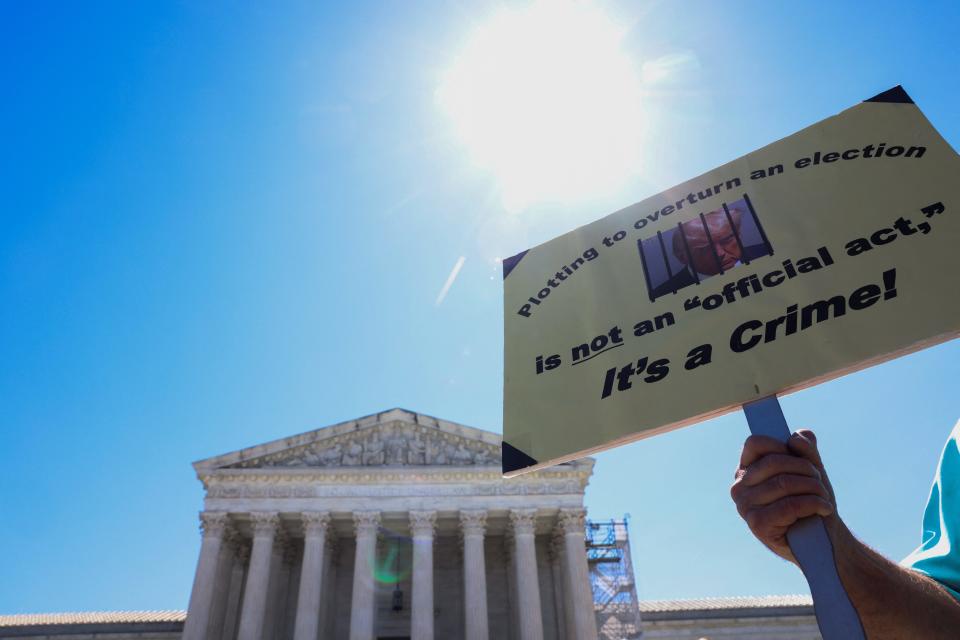The Supreme Court is restoring our democracy. Trump's immunity verdict is the right move.
- Oops!Something went wrong.Please try again later.
New Albany resident Philip Derrow is a retired business owner. He was a two-term member of the New Albany-Plain Local Board of Education. He is a frequent Columbus Dispatch contributor.
The U.S. Supreme Court continues to take important steps toward restoring our democracy. With partisans, pundits, and even a Supreme Court Justice ringing democracy’s death knell, I am more hopeful.
The day after the most embarrassing — if not frightening — presidential debate in my lifetime, the Supreme Court released its decision in a landmark case that began as a rather mundane dispute over who should pay for government inspectors on fishing boats.
The constitutional question at hand was the standard by which the judiciary interprets federal law.
For the past 40 years, that question has too often been answered under a doctrine known as Chevron Deference, requiring courts to defer to the judgment of federal administrative agencies, which are part of the Executive Branch. The court overruled Chevron.
Interestingly, the high court was two years behind the Ohio Supreme Court, which reached a similar decision about judicial deference in 2022.
Our democracy has survived.
The proper order is being restored

Three days after Chevron Deference was vanquished, the court released its much-anticipated decision in Trump v. United States, regarding the limits of presidential immunity.
Partisans immediately jumped in to once again pronounce the death of our democracy, as did Justice Sonia Sotomayor in her hyperbolic dissent.
After landmark Chevron ruling, could workplace safety agency OSHA be the next Supreme Court target?
Most of the attorneys with whom I’ve discussed this case view the majority decision to be a limited and rather straight-forward application of constitutional text and precedent.
The decision held that former, current, and future presidents have immunity for official acts similar to that enjoyed by judges, members of Congress, and other elected officials. Even I had immunity for official acts as an elected member of my local school board.
For a brief civics refresher, Article I of the U.S. Constitution vests all power to make the law in the legislature, Article II vests the power to enforce the law in the executive, and Article III vests the power to interpret the law in the judiciary.
This separation of powers is central to our constitutional order and these two most recent decisions — as well as the Dobbs abortion rights decision of 2022 — share a common feature of restoring that proper order.
Presidents shouldn't be hobbled
For roughly the past 90 years, Congress has delegated more and more of its law-making power to Executive branch agencies, theoretically under the control of the President. In reality, those agencies and their unelected staffers all too often operate as shadow legislatures, writing and enforcing their own laws.
By striking Chevron Deference, the court effectively returned some of that lawmaking responsibility — and accountability — to Congress.
Trump's 'Black jobs' rhetoric trades on racial stereotypes and fear of immigrants
Similarly, with the Trump decision, presidents are protected from partisan “lawfare” attacks that seek to hobble or harass a president they don’t like, while Congress retains the power to impeach, convict, and remove a lawless president from power.
When the courts thwarted parts of FDR’s New Deal, the President threatened to pack the Supreme Court with justices he believed would be more amenable. While FDR failed in his court-packing battle, he handily won the war for the balance of power as the Judiciary — cowed by the threat — mostly remained either silent or complicit as Congress shirked its responsibility and Presidents happily gobbled it up.
Democrats’ push to pack the Court today seeks strikingly similar — and profoundly anti-democratic — goals.
While it might seem counterintuitive for legislators to willingly cede power to alphabet agencies and the courts, the reason is simple — self preservation. The more they can offload the messy business of proper legislating to unaccountable bureaucrats and judges, the easier it is for them to avoid the electoral defeat they’d suffer for passing bad or unpopular laws.
Roe poisoned our politics for 50 year
The Dobbs decision, which overturned the 50 year-old Roe v. Wade, provided an object lesson in the benefits of returning power to where it rightly belongs.
Regardless of your views on abortion, Roe never had sound Constitutional underpinnings. Even the venerated Justice Ruth Bader Ginsburg recognized its shaky foundation, which was laid by the previous case of Griswold v. Connecticut. There, the Court found its basis in the “penumbras, formed by emanations” of the Constitution, rather than its actual words.
Divining auras is the purview of astrologers and mediums, not judges.
As bad as that was, Roe’s greatest flaw was the court’s usurping the proper role of citizens or their elected representatives in making new law.
Trump vs. Biden debate: 10 cartoons about first presidential debate
Roe poisoned our politics for 50 years and gave legislators a pass on writing laws they knew would never withstand scrutiny under Roe’s precedent. With Roe gone, some of those laws took effect and the people had their chance to weigh in, which they did around the country just as they had in the years before the Roe court decided to legislate from the bench.
Ohioans got their chance to show the power of actual democracy in action after Ohio legislators in 2023 passed and Gov. Mike DeWine signed a strict “heartbeat” anti-abortion law. Just a few months later, Ohio voters overwhelmingly passed Issue 1, effectively nullifying that law and guaranteeing abortion rights.
The Loper decision isn’t about who pays for government inspectors any more than Dobbs was about abortion rights. Both cases were about who decides the laws under which we live together as a society.
And, no, the Trump decision doesn’t portend a dictator in our midst either.

We are right to worry about our obviously feeble incumbent president on full display in the June 27 debate just as many worry about the character of his opponent.
The answer is not to arbitrarily diminish or enhance the power of any of our three branches of government but to restore the proper constitutional order that balances that power.
This Supreme Court is returning to us the gift of our democratic, constitutional republic.
Are we wise enough to keep it?
New Albany resident Philip Derrow is a retired business owner. He was a two-term member of the New Albany-Plain Local Board of Education. He is a frequent Columbus Dispatch contributor.
This article originally appeared on The Columbus Dispatch: US Supreme Court is restoring democracy with Trump's immunity ruling

